A recent study reveals significant contamination of water bodies in Africa by perfluoroalkyl and polyfluoroalkyl substances (PFAS), or “forever chemicals,” primarily due to industrial waste, agricultural runoff, and insufficient wastewater treatment. Countries such as South Africa and Kenya showcase alarming levels of PFAS. Urgent action is needed, including regulatory improvements, better wastewater treatment technologies, public awareness campaigns, and enhanced research efforts to mitigate these risks.
A recent study conducted by researchers Patrick Ssebugere, Ashirafu Miiro, and Oghenekaro Nelson Odume highlights the growing concern of perfluoroalkyl and polyfluoroalkyl substances (PFAS), commonly referred to as “forever chemicals,” contaminating water sources across Africa. These PFAS are problematic due to their persistence in the environment, their harmful effects on human health, wildlife, and ecosystems, and their significant presence in regions such as South Africa’s Vaal River, Kenya’s Nairobi River, and Lake Victoria.
The study, which analyzed various research studies from 11 African countries, found alarming levels of PFAS contamination primarily stemming from industrial discharges, agricultural runoff, and inefficient wastewater treatment practices. Notably, South Africa exhibited some of the highest levels of contamination. As these harmful chemicals accumulate in the environment, they pose serious risks to aquatic biodiversity and human health, potentially leading to kidney disease, reproductive issues, and developmental challenges in children.
Efforts to combat these contaminants include strengthening regulations in line with international agreements like the Stockholm Convention, enhancing wastewater treatment methods to eliminate PFAS more effectively, raising public awareness about the dangers of PFAS exposure, and bolstering research initiatives to address this urgent issue. With such measures, it is possible to mitigate the significant risks posed by forever chemicals in Africa, ensuring a healthier environment for both people and wildlife.
The term “forever chemicals” refers to a class of chemicals known scientifically as perfluoroalkyl and polyfluoroalkyl substances (PFAS). These substances are notorious for their durability and resistance to degradation in the environment, leading to their accumulation in various ecosystems. The emerging research indicates that PFAS are not only prevalent in industrialized nations but also represent a critical but underreported environmental hazard across Africa. The continent’s water bodies, particularly in urban and industrial areas, are increasingly becoming hotspots for PFAS contamination, raising alarm among environmental scientists and public health officials.
The presence of PFAS in African water bodies poses a significant environmental and public health challenge. As the study reveals, industrial activities, agricultural practices, and inadequate wastewater treatment methods are primary contributors to this contamination. To effectively combat this issue, there is an urgent need for strengthened regulatory frameworks, advanced technology implementation in wastewater treatment, public education about PFAS dangers, and increased scientific research. Addressing these factors will be crucial in ensuring safer water resources and protecting the health of both humans and wildlife.
Original Source: theconversation.com







